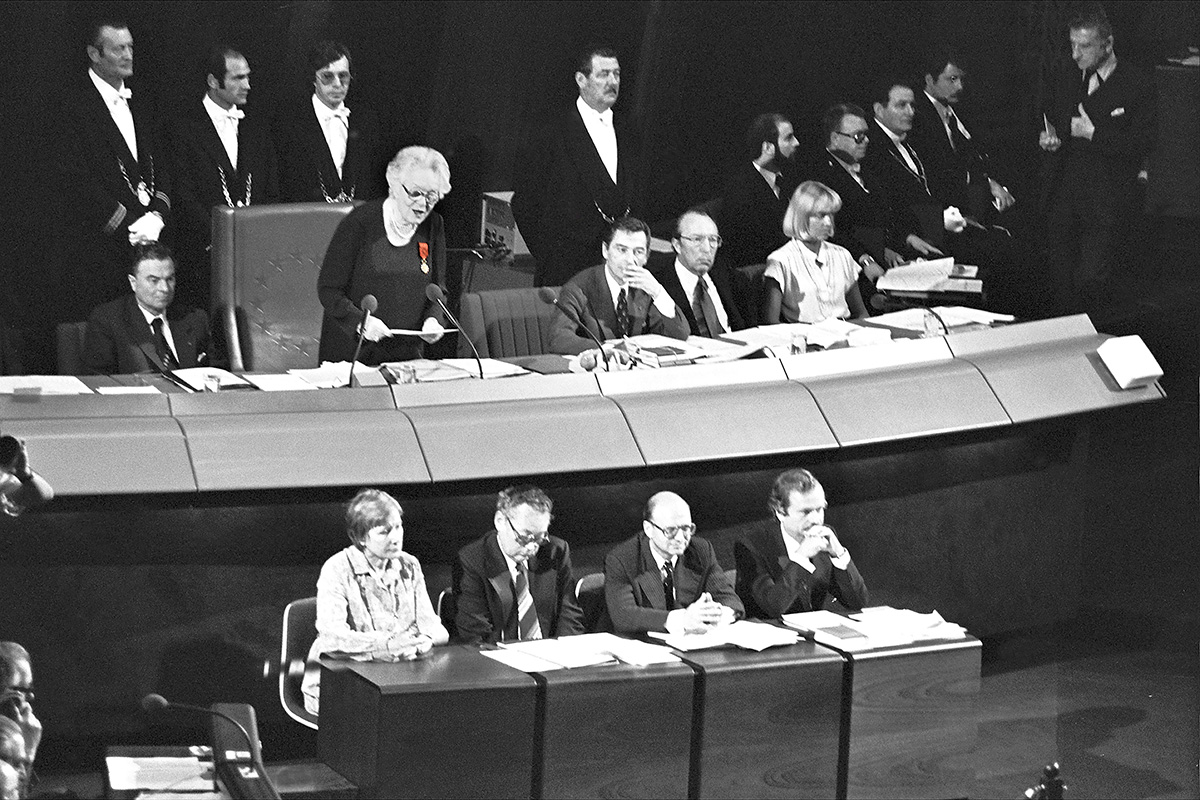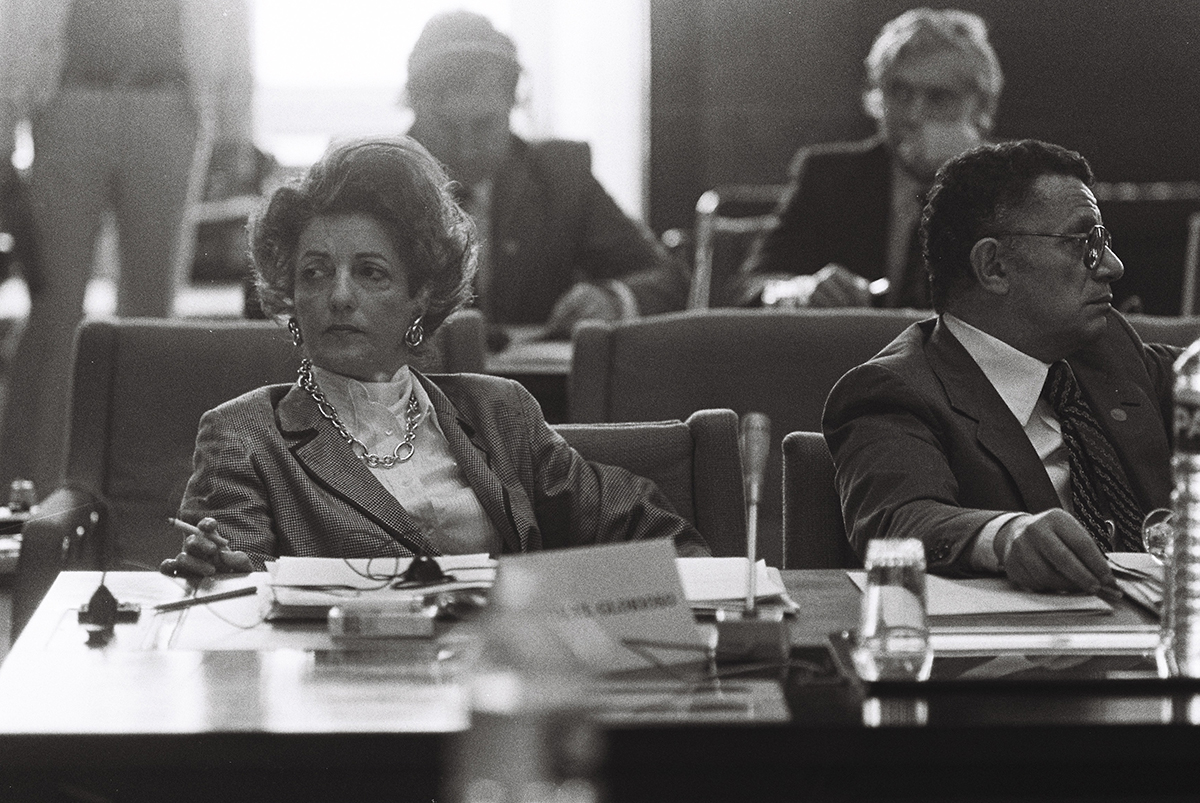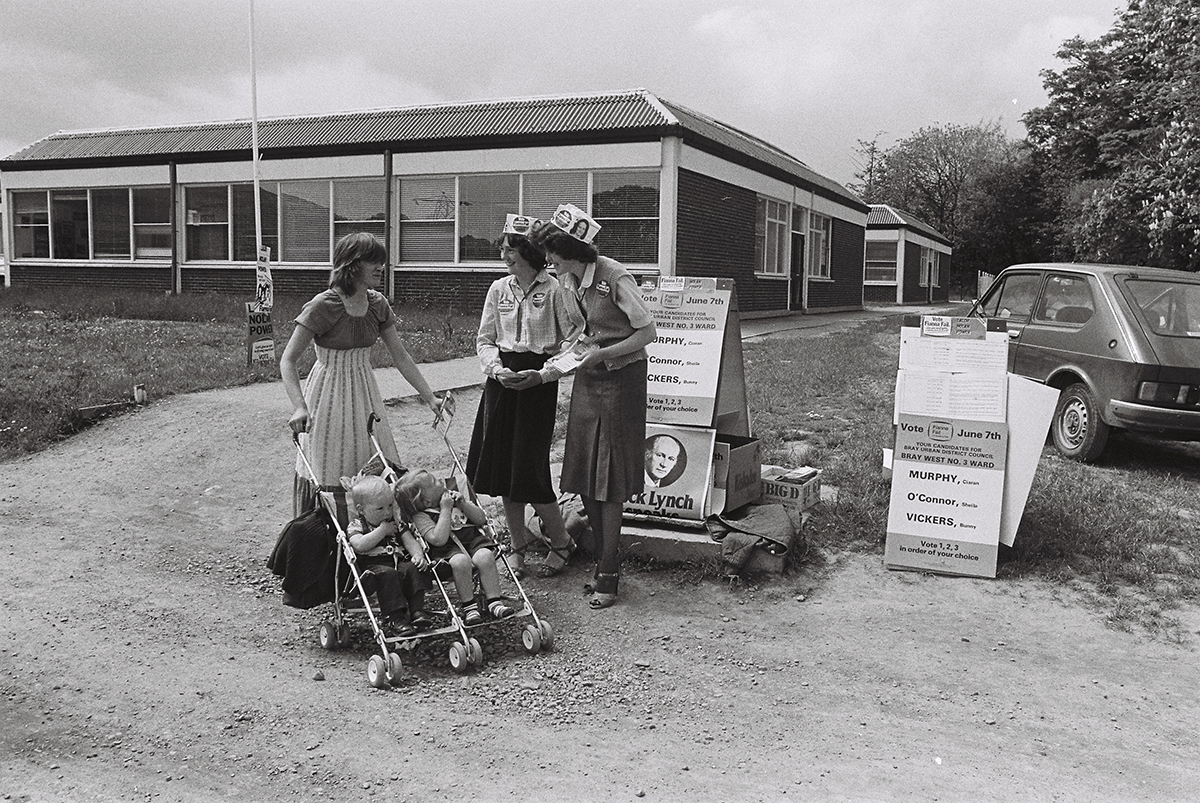This year, 2023, the EU is celebrating 30 years since the launch of the single market – when the free movement of goods, services, people and capital became a reality. It was one more milestone in what has long been a very ‘masculine’ history, inextricably linked to the ‘founding fathers’ such as Altiero Spinelli, Alcide de Gasperi and Jean Monnet. And while women have also played their part in bringing about European integration, they haven’t been recognised in the same way.
 As the oldest Member, Louise Weiss addresses the inaugural sitting of the first elected European Parliament in Strasbourg, 17 July 1979. She is wearing her star of Grand Officer of the Legion of Honour © European Union
As the oldest Member, Louise Weiss addresses the inaugural sitting of the first elected European Parliament in Strasbourg, 17 July 1979. She is wearing her star of Grand Officer of the Legion of Honour © European Union
You may have heard of Louise Weiss, for example, but how about Eliane Vogel Polsky? She was a Belgian lawyer who managed to establish that Article 119 of the EC Treaty on equal pay for women and men was directly applicable. She was also responsible for ensuring that the European Court of Justice recognised the principle of equality and non-discrimination as a fundamental right of the EU. Another prominent founding mother was Sofia Corradi, who first had the idea for the Erasmus programme in 1969, and worked away patiently for years before finally seeing the launch of her brainchild in 1987.
Italian researcher Maria Pia Di Nonno’s thesis ‘The founding mothers of Europe’ (which later formed the basis of an exhibition) focused on the role of women in the history of the EU. The European Parliament's Newshound interviewed her about her work.
How did you come up with the idea of writing a thesis on the ‘founding mothers’?
It was the subject I chose for my thesis and research at the Sapienza University of Rome in 2015 (although I had started to think about this theme in 2014). It was said to me that the title of the project sounded a bit like a political slogan, and that I wouldn’t find much... But I persevered and went to Florence, to consult the historical archives of the European Union. And that’s where I found my first results, on Fausta Deshormes La Valle: a formidable Commission official from the 1960s to the 1990s, she was the person who launched the first initiatives aimed at young people, and later conceived the ‘Women of Europe’ network, and for whom I have great admiration.
What did it mean to be a ‘founding mother’ in a rather male political world at the very start of the European project?
The words ‘mothers’ and ‘fathers’ should really be taken with a grain of salt: it gives the impression that Europe fell from the sky! However, it was built on the ground, and women, who were perhaps not on the front line, played an undeniable role from the very beginning of the construction of Europe, and even before, from the base of civil society. It wasn’t until the 1970s that we saw more women in positions of political responsibility - and even at the end of the decade, in 1978, that we saw a woman head a European institution (the European Economic and Social Committee): Fabrizia Baduel Glorioso [editor’s note: who later became an MEP].
 Members of the Political Affairs Committee Maria Fabrizia Baduel Glorioso (L) and Sergio Camillo Segre (R) at the Egmont Palace in Brussels © European Union, 1980
Members of the Political Affairs Committee Maria Fabrizia Baduel Glorioso (L) and Sergio Camillo Segre (R) at the Egmont Palace in Brussels © European Union, 1980
It’s also a question of media interest: a group of women contributed to the work of the Hague Congress (in 1948, which laid the foundations of European federalism), but there is scarcely a trace of this in the newspapers of the time...
And finally, a perfect example of this ‘field’ role is Ursula Hirschmann: she may not have written the Ventotene Manifesto, the precursor text of European federalism written in 1941 by Altiero Spinelli, Ernesto Rossi and Eugenio Colorni (placed under house arrest on the island of Ventotene, off the coast of Rome), but it was as a politically and socially committed woman (not just a wife and mother) that she was able to contribute to the dissemination of the text across the continent. And she went on to found Women for Europe in Brussels in 1975.
The introduction to your book says that “by telling the stories of these women, a new way of being European is still possible”. Do you still feel the same way, six years after writing these lines?
It’s still the case. And besides, the idea of the ‘founding mothers’ project is not to idolise a perfect, mythical woman, but to rebalance: to show that the European Union is and has always been something that starts from the bottom up. Alongside the women I talk about in my book and in the exhibitions that accompanied it, there are those people ‘in the shadows’ - men, women, young people, all of whom, at their own level, can make a difference for Europe.
 Voting in the 1979 direct elections to the European Parliament in Co. Wicklow, Ireland © European Communities, 1979
Voting in the 1979 direct elections to the European Parliament in Co. Wicklow, Ireland © European Communities, 1979
If you were to update your list, which woman would you choose?
I see big similarities between 1979 (when Simone Veil became president of the Parliament after the first direct European elections) and 2019, when we saw women like Ursula von der Leyen and Christine Lagarde taking the helm of very important international institutions. It is a kind of passing of the baton between these two generations, and a sign that things are changing.
How do you look back on your work on the ‘founding mothers of Europe’?
I would say that the project has come a long way. Since it was launched in 2014, it has given rise to a thesis, which has become a book and a travelling exhibition (bilingual Italian-English, and rewarded by the European Commission), and led to around 100 conferences. The subject was embraced by people who were passionate about the issue, and who thus brought it to life over time, so to speak, with whom I had fascinating discussions.
My feeling, and my conclusion: I believe there are still people out there we don’t know of, waiting to be discovered, who contributed, in the shadows, to the European project. But that’s a job for another researcher!
First appeared in Newshound, Edition 738: 8 March 2023.